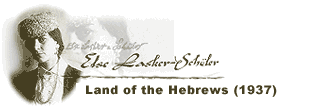
| From
her refuge in Switzerland, Lasker-Schüler made several visits
to Palestine — the idyllic land she yearned for and embodied in
her drawings and poetry. During her second visit in 1934, the poet
was deeply disillusioned by the harsh reality of social tensions and
political turmoil in the land. The impressions of this visit to the
Holy Land as recorded in her prose work The Land of the Hebrews, represent,
nonetheless, a visionary account which glorifies the Palestine of
her dreams. The following is a selection from Land of the Hebrews
(Das Hebräerland). |
Palestine is the land
of the book of God, Jerusalem — God's veiled
bride. I came out of the desert, journeyed to the sacred marriage, a guest
at the festivities that always encompass Jerusalem. Beneath its heaven's
canopy, it is always wedding-day. God adores Jerusalem and has enclosed
it in his heart. He has chosen this eternal city of cities. Every guest
who enters this city exchanges his clothes for holy garments. This pious
transformation obliges all to behave solemnly and courteously, so as not
to startle the devout spirit of the select, exalted city. I must say,
I have never perceived a piercing voice, nor a shrill sound in Jerusalem,
neither in its streets nor in its houses and palaces. Because of this,
you can hear all the more clearly God's breathing. Overwhelmed by His
presence, you begin to tremble. One must accustom oneself to God. And
it is well to cleanse oneself, to be ever better. The soul is seized by
the deepest fear and begins to burn. Often I have wished to hide myself
from God.
Not everyone who comes
to the land of Palestine lives there conscious of his duty. Palestine
makes demands!!! for recovery in the spiritual sense, Jerusalem, the capital
of Palestine, is the proper place, the healing bath of the soul. For the
city blesses those who long for its blessing, the devout city comforts
those who wish to be comforted. Jerusalem is the observatory of the hereafter,
the heaven before Heaven. In this heavenly creation the First Temple was
built.
The towns of Palestine
are all small in size, but manifold within. For its part, the countryside
around them exceeds the surroundings of all the towns and villages on
earth in breadth, in immensity of extent. I have no wish to set a stage
of fantasy yet I do believe that I must stress the boundless distances
with their pyramids of rock and dizzy chasms, to allow those who have
never seen Palestine with their own eyes a reasonable idea of the enchanted
land. Words cannot encompass it. Jerusalem itself is of small build, God's
chosen bride in the land of Palestine, but of stature so immense in her
lilac-sky cloak and stone-chasm robes. A little town, a winsome citadel
His Zion — rises up with every stone in a frame
of rock. Palestine cannot be compared with any land on earth. Palestine
is not entirely of this world, it borders on the hereafter ad like heaven
is not to be measured in time or space. Some may even look benevolently
on the "exaggerations" (?) of a poet, but the blessed land needed
a poet to come extol it….
The Hebrew pioneer
awakened Palestine from its thousand-year biblical fairy-tale sleep. He
lifted up the goblet, the lost promised land. He filled it with the vine
of his blood, sacrificed his life to God to win it anew —
in a higher form. It was the pioneers, the first colonists, who took upon
themselves the fever of the cool waters; some died. They dug not for gold,
but for God!! All those who left life young and those who remain alive,
are the Princes of the land! And yet they who till the fields and bring
the fruits to ripeness move with modesty among their brothers and sisters
of the cities. Proud are the stones — between
them blooms a small, green bush, beneath which rests a weary pioneer.
A bedouin of hills gently urges on his camel: "Ana hatu inaha
ana! La la la, la . . . la la la, la!" March and the month of
April embroider the carpets of the countryside with incomparable flowers
and grasses….
To question no more
the truth of our sanctified books one must live or have lived a while
in Palestine. A sojourn in the Promised Land, above all in Jerusalem,
strengthens one's belief in God, in the "reposing deity," upon
whose cheek Jerusalem reclines.
I asked the nice Talmud
students if they could tell me how old God is? Even their great Rav, they
all agreed, could not answer this question, but I might ask Rabbi Kook
personally, or his little two-year old granddaughter Zipora, for Adonai
is not only the oldest of the old, but also the youngest of the young
— according to his own words: "I am that
I will be." Ceaselessly the glow of future eternity flows about the
Lord. from one of the darkening corners of the Talmud classroom, a murmur
of agreement echoes across to us chatting students. They asked me to recite
for them one of my favorite Hebrew Ballads. "To God". . .
 |
Translation:
Durchslag, Audri and Jeanette Litman-Demeestère. Else Lasker-Schüler:
Hebrew Ballads and Other Poems. Philadelphia: Jewish Publication
Society, 1980, pp. 51-55. Used by permission
of JPS.
|
LASKER-SCHÜLER
Introduction
|

